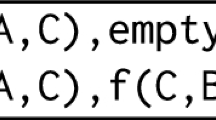Abstract
We consider the learnability of classes of logic programs in the presence of noise, assuming that the label of each example is reversed with a fixed probability. We review the polynomial PAC learnability of nonrecursive, determinate, constant-depth Horn clauses in the presence of such noise. This result is extended to an analogous class of recursive logic programs that consist of a recursive clause, a base case clause, and ground background knowledge. Also, we show that arbitrary nonrecursive Horn clauses with forest background knowledge remain polynomially PAC learnable in the presence of noise. We point out that the sample size can be decreased by using dependencies among the literals.
Preview
Unable to display preview. Download preview PDF.
Similar content being viewed by others
References
D. Angluin and P. Laird.Learning from noisy examples. Machine Learning, 2(4):343–370, 1988.
J. A. Aslam and S. E. Decatur. Improved noise-tolerant learning and generalized statistical queries. Technical Report TR-17-94, Center for Research in Computing Technology, Division of Applied Sciences, Harvard University, 1994.
W. W. Cohen. Pac-learning recursive logic programs: efficient algorithms. J. AI Research, 2:501–539, 1995.
W. W. Cohen. Pac-learning recursive logic programs: negative results. J. AI Research, 2:541–573, 1995.
S. E. Decatur. Statistical queries and faulty PAC oracles. In Proc. 6th Annu. Workshop on Comput. Learning Theory, pages 262–268. ACM Press, New York, NY, 1993.
S. Dźeroski. Learning first-order clausal theories in the presence of noise. In Proc. 5th Scandinavian Conf. on Artificial Intelligence, Amsterdam, 1995. IOS Press.
S. Džeroski, S. Muggleton, and S. Russell. PAC-learnability of determinate logic programs. In Proc. 5th Annu. Workshop on Comput. Learning Theory, pages 128–135. ACM Press, New York, NY, 1992.
R. Gennaro. PAC-learning PROLOG clauses with or without errors. Tech. Memo 500, MIT Laboratory for Computer Science, 1994.
S. A. Goldman and R. H. Sloan.Can PAC learning algorithms tolerate random attribute noise? Algorithmica, 14:70–84, 19953.
W. Hoeffding. Probability inequalities for sums of bounded random variables. tJournal of the American Statistical Association, 58(301):13–30, Mar. 1963.
T. Horvith and G. Turin. Learning logic programs with structured background knowledge. In L. De Raedt, editor, 5th Int. Workshop on Inductive Logic Programming, pages 53–76, 1995. Also in Advances in Inductive Logic Programming (ed. L. De Raedt). IOS Press, 1996, pages 172-191. (IOS Frontiers in AI and Appl.).
M. Kearns. Efficient noise-tolerant learning from statistical queries. In Proc. 25th Annu. ACM Sympos. Theory Comput., pages 392–401. ACM Press, New York, NY, 1993.
M. Kearns and M. Li. Learning in the presence of malicious errors. SIAM J. Comput., 22:807–837, 1993.
M. J. Kearns and U. V. Vazirani.An Introduction to Computational Learning Theory. The MIT Press, Cambridge, Massachusetts, 1994.
N. Lavrać and S. Dźeroski. Inductive learning of relations from noisy examples. In S. H. Muggleton, editor, Inductive Logic Programming, pages 495–514, London, 1992. Academic Press.
N. Lavrač and S. Džeroski. Inductive Logic Programming: Techniques and Applications. Ellis Horwood, New York, 1994.
N. Lavrač, S. Dieroski, and I. Bratko. Handling imperfect data in inductive logic programming. In L. De Raedt, editor, Advances in Inductive Logic Programming, pages 48–64. IOS Press, 1996.
Y. Mansour and M. Parnas. On learning conjunctions with malicious noise. In Israel System and Theory Computer Symposium (ISTCS 96), 1996. (To appear).
S. Muggleton and C. Feng. Efficient induction of logic programs. In S. Muggleton, editor, Inductive Logic Programming, pages 281–298. Academic Press, 1992.
G. Shackelford and D. Volper. Learning k-DNF with noise in the attributes. In Proc. 1st Annu. Workshop on Comput. Learning Theory, pages 97–103, San Mateo, CA, 1988. Morgan Kaufmann.
R. H. Sloan. Four types of noise in data for PAC learning. Inf. Process. Lett., 54:157–162, 1995.
A. Srinivasan, S. H. Muggleton, and M. Bain. Distinguishing exceptions from noise in non-monotonic learning. In Proc. Second International Workshop on Inductive Logic Programming, Tokyo, Japan, 1992. ICOT TM-1182.
L. G. Valiant. Learning disjunctions of conjunctions. In Proceedings of the 9th International Joint Conference on Artificial Intelligence, vol. 1, pages 560–566, Los Angeles, California, 1985. International Joint Committee for Artificial Intelligence.
Author information
Authors and Affiliations
Editor information
Rights and permissions
Copyright information
© 1997 Springer-Verlag Berlin Heidelberg
About this paper
Cite this paper
Horváth, T., Sloan, R.H., Turán, G. (1997). Learning Logic programs with random classification noise. In: Muggleton, S. (eds) Inductive Logic Programming. ILP 1996. Lecture Notes in Computer Science, vol 1314. Springer, Berlin, Heidelberg. https://doi.org/10.1007/3-540-63494-0_63
Download citation
DOI: https://doi.org/10.1007/3-540-63494-0_63
Published:
Publisher Name: Springer, Berlin, Heidelberg
Print ISBN: 978-3-540-63494-2
Online ISBN: 978-3-540-69583-7
eBook Packages: Springer Book Archive




